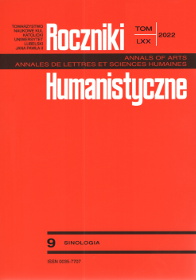Miejsce i rola kultury sino-konfucjańskiej i konfucjanizmu w historii świata według myśli Lianga Shuminga o życiu i kulturze
Abstrakt
Pojmowanie kultury chińskiej przez Lianga Shuminga, którą uważał ją za kulturę sino-konfucjańską, oraz jego rozumienie konfucjanizmu różnią się od potocznych i znanych w świecie akademickim. W poszukiwaniu autentycznej egzystencji, w schemacie trzech rodzajów kultur świata (kultura zachodnio-pragmatyczna, kultura sino-(Taizhou 泰州-)konfucjańska i kultura indo-(weishi-)buddyjska) oraz ich historycznej sukcesji, Liang Shumin żywił przekonanie, że przyszłym modelem kultury światowej będzie ta sino-konfucjańska, a nawet przepowiedział, że w najbliższej przyszłości emocja miłości w jej szczególnej formie jako miłość między mężczyzną a kobietą byłaby największym i najstraszniejszym problemem tego okresu, tj. okresu drugiej domeny warunkowej dostępności lub niedostępności przedmiotu pożądania, czyli innego umysłu lub woli drugiego człowieka. Tę dziedzinę Liang Shuming nazywa sferą relacji międzyludzkich, czyli problemem społecznym, za którego rozwiązanie odpowiada kultura chińsko-(Taizhou 泰州-)konfucjańska. Autor koncentruje się na miejscu i roli konfucjanizmu, w rozumienia Lianga Shuminga, w Shuminga schemacie historii świata.
Bibliografia
Adcock Kaufman, Alison. “The ‘Century of Humiliation,’ Then and Now: Chinese Perceptions of the International Order.” Pacific Focus vol. 25, no. 1, 2010, pp. 1-33.
Alitto, Guy S. The Last Confucian. Liang Shu-ming and the Chinese Dilemma of Modernity. University of California Press, 1979.
Alitto, Guy S. The Conservative as Sage: Liang Shu-ming.” The Limits of Change. Essays on Conservative Alternatives in Republican China, ed. Charlotte Fürth, Harvard University, 2005, pp. 213-241,
Cheng, Yu-Yin. “The Taizhou School (Taizhou xuepai 泰州學派) and the Popularization of Liangzhi 良知 (Innate Knowledge).” Ming Studies vol. 60, 2009, pp. 45-65.
Flew, Antony G.N., editor. Logic and Language. Basil Blackwell, 1951.
Hanafin, John J. “The ‘Last Buddhist’: The Philosophy of Liang Shuming.” New Confucianism: A Critical Examination, ed. John Makeham 梅約翰 梅约翰, Palgrave Macmillan, 2003, pp. 187-218.
Kuhn, Philip A. “Origins of the Taiping Vision: Cross-Cultural Dimensions of a Chinese Rebellion.” Comparative Studies in Society and History vol. 19, no. 3, 1977, pp. 350-366.
Liang, Shuming. Fundamentals of Chinese Culture. Trans. Li Ming. Amsterdam University Press, 2021.
Major, Philippe. “Textual Authority and Its Naturalization in Liang Shuming’s Dong – Xi wenhua ji qi zhexue.” Monumenta Serica vol. 65, no. 1, 2017, pp. 123-145.
Meynard, Thierry. The Religious Philosophy of Liang Shuming: The Hidden Buddhist. Brill, 2011.
Poškaitė, Loreta. “Filial Piety (xiao 孝) in the Contemporary and Global World: A View from the Western and Chinese Perspectives.” Asian Studies II vol. 18, no. 1, 2014, pp. 99-114.
Qi, Xiaoying. “Filial Obligation in Contemporary China: Evolution of the Culture-system.” Journal for the Theory of Social Behaviour vol. 45, no. 1, 2015, pp. 141-161.
Streng, Frederick J. “Three Approaches to Authentic Existence: Christian, Confucian, and Buddhist.” Philosophy East and West vol. 32, no. 4, 1982, pp. 371-392.
Tu, Wei-ming. “Hsiung Shih-li’s Quest for Authentic Existence.” The Limits of Change: Essays on Conservative Alternatives in Republican China, ed. Charlotte Furth, Harvard University Press, 1976, pp. 242-273 and 396-400. Also in: Tu Wei-ming. Humanity and Self-Cultivation: Essays in Confucian Thought. Cheng & Tsui Company, 1998, pp. 219-256.
Wesołowski, Zbigniew. “Liang Shumings (1893-1988) Religionsbegriff.” “Fallbeispiel” China. Ökumenische Beiträge zu Religion, Theologie und Kirche im chinesischen Kontext (China – Model Case. Ecumenical Contributions on Religion, Theology, and Church within the Chinese Context), ed. Roman Malek, Steyler Verlag, 1996, pp. 241-267.
Wesołowski, Zbigniew. Lebens- und Kulturbegriff von Liang Shuming (1893-1988). Dargestellt anhand seines Werkes Dong-Xi wenhua ji qi zhexue 東西文化及其哲學. Institut Monumenta Serica, 1997.
Wesołowski, Zbigniew (Wei Siqi 魏思齊). Liang Shuming (1893-1988) de wenhua guan: genju Dong–Xi wenhua ji qi zhexue yu Zhongguo wenhua yaoyi 梁漱溟 (1893-1988)的文化觀-根據《東西文化及其哲學》與《中國文化要義》解說 (Liang Shuming’s [1893-1988] Concept of Culture Based on his Works: Dong-Xi wenhua ji qi zhexue and Zhongguo wenhua yaoyi). Furen daxue chubanshe, 2003.
Wesołowski, Zbigniew. “Understanding the Foreign (the West) as a Remedy for Regaining One’s Own Cultural Identity (China): Liang Shuming’s (1893-1988) Cultural Thought”. Monumenta Serica vol. 53, 2005, pp. 361-399.
Whyte, Martin. “Filial Obligations in Chinese Families: Paradoxes of Modernization.” Filial Piety: Practice and Discourse in Contemporary East Asia, ed. Charlotte Ikels, Stanford University Press, 2004, pp. 106-127.
Yang, Xiaomei. “How to Make Sense of the Claim ‘True Knowledge is What Constitutes Action’: A New Interpretation of Wang Yangming’s Doctrine of Unity of Knowledge and Action.” Dao vol. 8, 2009, pp. 173-188.
Zhexue da cidian: Zhongguo zhexue shi juan 哲學大詞典:中國哲學史卷, ed. Yan Beiming 嚴北溟, Shang-hai ci-shu chu-ban-she, 1985.
Copyright (c) 2022 Roczniki Humanistyczne

Utwór dostępny jest na licencji Creative Commons Uznanie autorstwa – Użycie niekomercyjne – Bez utworów zależnych 4.0 Międzynarodowe.





